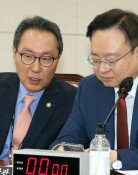Disaster Leadership
Typhoon Morakot struck Taiwan in August last year, killing 670 people. The Taiwanese, shocked by the sheer magnitude of the disaster, vented their anger on their government several days later. Government mistakes and mishandling were brought up in succession, including failure to predict the typhoon, negligence in rescue efforts, and delays in mobilizing the military that led to snowballing damage. A week after the disaster, Taiwanese President Ma Ying-jeou made a public apology. We couldve responded better and faster, and Im sorry that the government failed to do so, He said. The Taiwanese publics anger did not subside, however. His approval rating plunged from 40 percent to 23 percent, yet Ma overcame the crisis with the resignation of Prime Minister Liu Chao-shiuan.
Chile has suffered huge damage from a devastating earthquake that erupted last week. France also lost 51 people to the winter storm Xynthia Sunday. However advanced science and technology become, humans remain helpless against natural disasters such as earthquakes and typhoons. Yet if they meticulously prepare for disasters and effectively cope with them when they occur, this can reduce the damage. Chile experienced an earthquake about 1,000 times more powerful than the one that hit Haiti, but suffered casualties 1/1,000th that of Haiti. This was partly because of the strong infrastructure in the Latin American country that was ready for an earthquake, but the disaster leadership of its government and leader also shined amid the devastation.
Chilean President Michelle Bachelet appeared on TV an hour after the earthquake hit. Immediately after announcing the disaster and explaining her governments response, she boarded a chopper. She visited six areas that suffered massive damage and tried to console the public. When looting erupted in Maule and Concepcion, two cities that were heavily affected by the quake, she immediately declared martial law and deployed troops to restore order. International media gave Chiles first female president high marks by comparing her with Haitian President René Préval, who went into hiding for several days after the earthquake hit his country.
President Bachelet will complete her four-year term March 10. She has demonstrated extraordinary competence in consolidating the public and overcoming the global economic crisis. She still enjoys an approval rating of more than 80 percent. If she could run for reelection, the Chilean people would make her president again. Victims of the earthquake have a good reason to say, It was fortunate to have Bachelet amid the disaster. U.N. Assistant Secretary-General Catherine Bragg said, "The Chilean government is in the driver`s seat," praising Bachelets leadership. "At this point, the government is on top of the situation, they are handling the situation well. It`s a strong government with strong institutions."
Editorial Writer Bhang Hyeong-nam (hnbhang@donga.com)
Headline News
- Israel prepares for retaliation against Iran
- Samsung reclaims top spot, surpassing Apple in smartphone market
- 77% of Koreans in 20s and 30s are 'Kangaroo Tribe' due to job crisis
- KBO referees embroiled in controversy over ABS decision concealment
- Inflation, oil price surge put double shock on global economy







